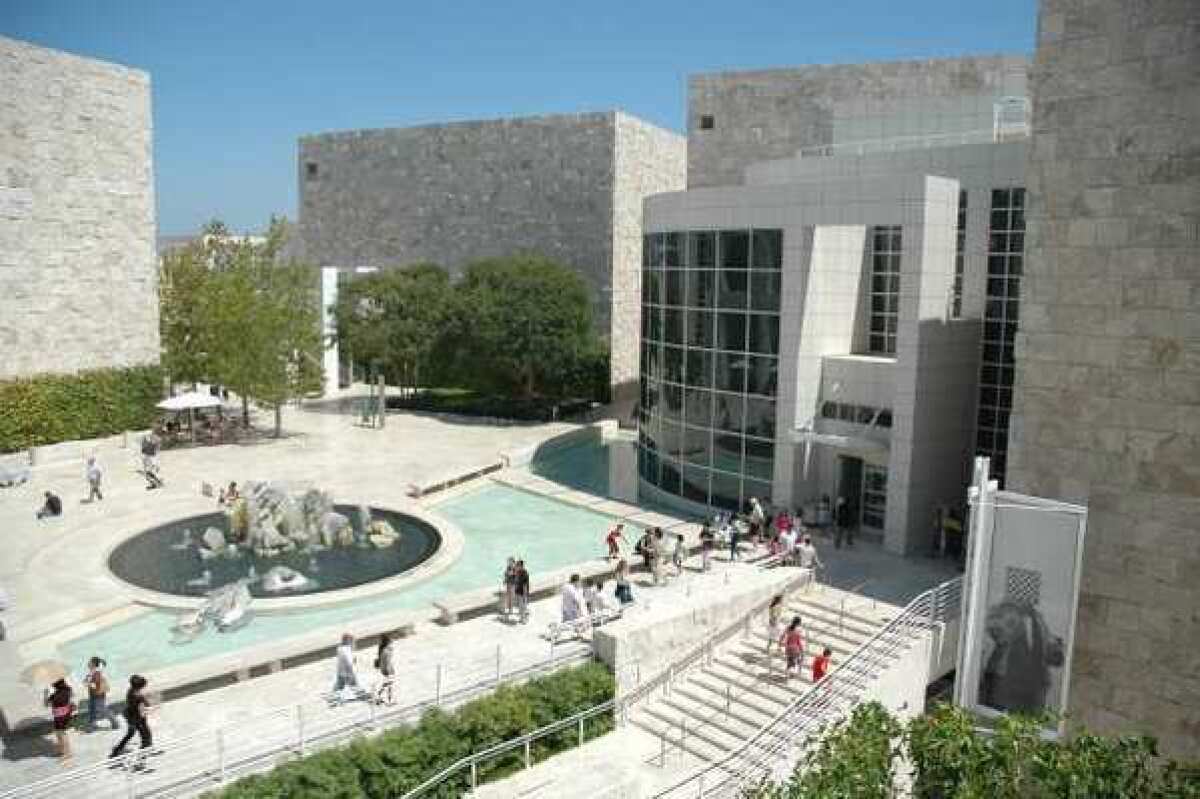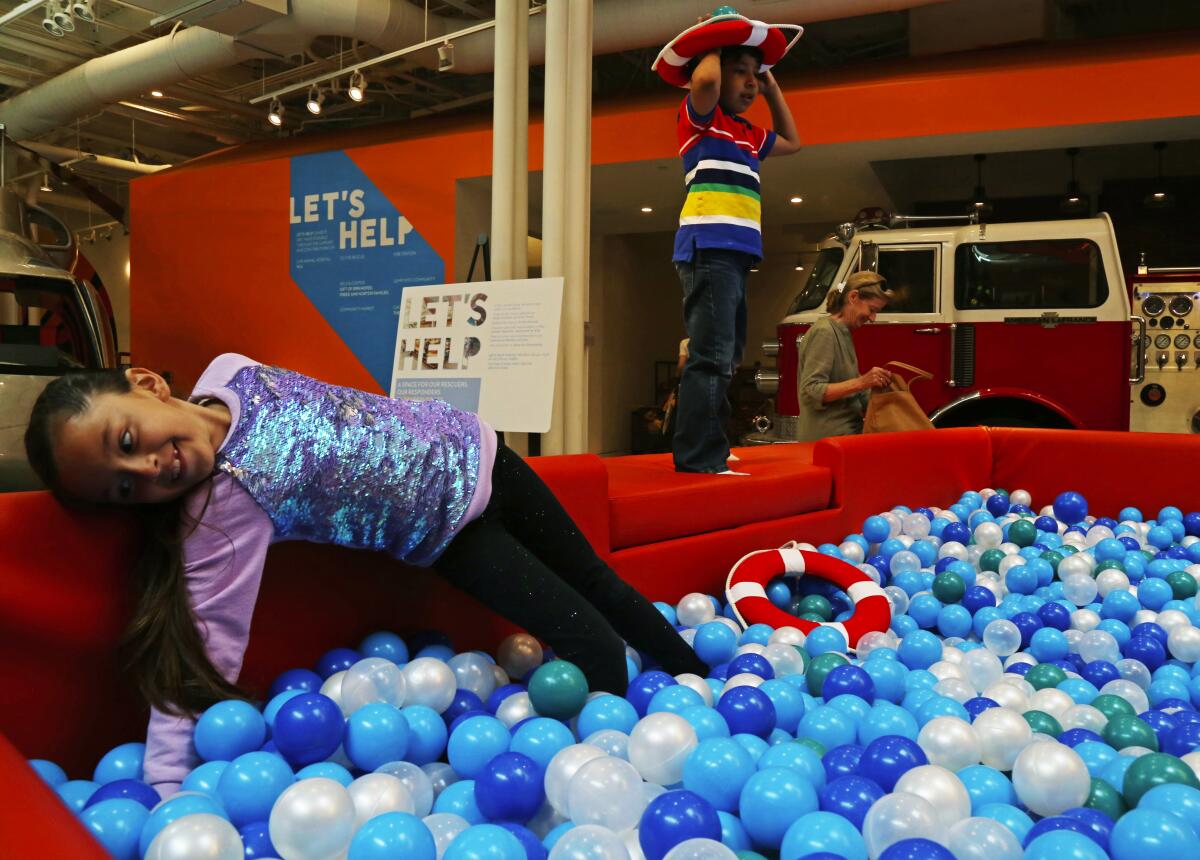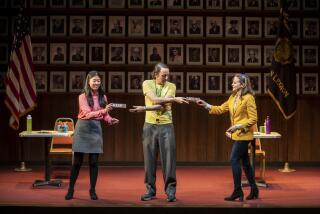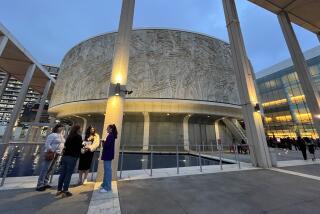California museums and theaters shift coronavirus planning into a higher gear

- Share via
The novel coronavirus has closed movie theaters, theme parks and film shoots in China. It has shuttered the Louvre Museum in Paris and La Scala opera house in Milan, and not far away in Venice, Italy, it cut short Carnival. Travel bans meant to curb person-to-person spread of a virus have trimmed attendance at film and gaming conferences, and some music festivals and concerts have been postponed indefinitely.
Now the virus’ recent detection on the West Coast has spurred arts institutions here to go on high alert in the event the disease spreads greatly beyond the 40-plus cases that have been reported in California.
The common line among museums and theaters is that they are monitoring the situation and planning to operate as usual, unless told otherwise by county or state health departments, the Centers for Disease Control and Prevention or the World Health Organization. Even though more than 3,000 have died from COVID-19 worldwide, health officials have not recommended closure of venues or the cancellation of public events in California because the immediate risk of transmission remains low.
The Getty Trust, whose operations include the Getty Center in Brentwood and the Getty Villa in Pacific Palisades, said it formed a coronavirus task force “to assure that we are keeping our employees, volunteers and visitors safe and closely informed.” Employee travel to Italy, China and South Korea — all coronavirus hot spots — has been canceled.
The Museum of Contemporary Art has a coronavirus task force that is meeting daily, and a spokeswoman said, “we are communicating closely with our colleagues at other institutions in Los Angeles.”
With the phrase “hands-on exhibits” taking on new meaning to a germ-phobic public, the Natural History Museum of Los Angeles County and its sister sites, the La Brea Tar Pits and the William S. Hart Museum, have added more hand sanitizers. The Cayton Children’s Museum, which opened last year in Santa Monica, stressed that its daily sanitizing procedures cover not just exhibits and bathrooms but also door handles and handrails.
The Skirball Cultural Center already has a thorough regimen for deep cleaning and disinfecting its facilities, said Mia Cariño, vice president of communications and marketing. But added measures are being taken inside for the popular Noah’s Ark interactive children’s playland.
“In an abundance of caution at this time, we have stepped up cleaning protocols for objects and surfaces inside Noah’s Ark at the Skirball given the highly interactive nature of the experience,” she said, adding that restrooms located inside the Noah’s Ark galleries make it easier for staff and visitors to wash hands.

The Music Center — which operates venues for Los Angeles Philharmonic, Los Angeles Opera, the L.A. Master Chorale and Center Theatre Group — said it has increased disinfection practices at Walt Disney Concert Hall, Dorothy Chandler Pavilion, Ahmanson Theatre and Mark Taper Forum. The Music Center has set up additional hand sanitizer stations across the downtown L.A. campus and implemented more flexible ticket exchange policies.
All of the region’s more established theaters reached by The Times, including the Geffen Playhouse, the Odyssey and South Coast Repertory, said they will carry on with programming plans, at least for now. Most have added hand sanitizers or cleansing wipes. Theaters reported receiving few audience inquiries about contingency plans. Nevertheless, some, including American Conservatory Theatre in San Francisco, are sending an email of reassurance to patrons.
“We just want to let our audiences and supporters know we care about them, we’re actively aware of the latest information and we’re working to ensure that they are healthy and safe,” said Jennifer Bielstein, ACT’s executive director. “Their safety is always the most important thing.”
The 24th Street Theatre in L.A. is opening its backstage bathrooms for audience members before and after performances, so more sinks are available for washing hands. The theater also installed signs advising proper hand-washing practices and paused the use of theatrical masks during student workshops.
Many houses around town like the Fountain Theatre and Echo Theater Company are discussing how to brace for the effect the coronavirus might have on audience retention.
“That may seem premature, but to me, it isn’t,” said Stephen Sachs, co-founder and co-artistic director of the Fountain. “This is such an extraordinary and rapidly changing situation. It’s not a matter of waiting for the virus to get here. It has arrived. It’s something we’re gonna have to deal with — to what extent, we don’t know. The best thing we can all do is start talking about it and not be in denial about it so we can deal with it clearly and responsibly.”
Actors’ Equity, the union representing theater actors and stage managers, issued a statement that said “the best way to remain safe in the workplace is to focus on the facts and not fear.”
“We have shared guidance with staff, posted resources for members and are having the appropriate internal conversations about maintaining business continuity if an outbreak becomes more severe,” wrote Brandon Lorenz, Equity’s national director of communications. “We have also initiated conversations with major Equity employers and other labor leaders around maintaining a safe and healthy workplace.”
On Broadway, the show will go on — for now. The Broadway League — the 700-plus-member organization that includes theater owners and operators, producers, presenters and general managers in North American cities, as well as suppliers of goods and services to the commercial theater industry — issued a statement Monday, shortly after the first case of the virus was confirmed in New York City.
“The Broadway League is closely monitoring this evolving situation on behalf of the Broadway community,” the statement read. “The safety and security of our theatergoers and employees is our highest priority. We are following the lead of our city, state and federally elected officials, as well as implementing strategies recommended by public health authorities in all of our theaters and offices. We remain vigilant, and we are prepared to make decisions based on current needs, as well as in response to changing conditions.”
Beyond these immediate operational preparations, “there are medium- and longer-term consequences to consider,” noted Teresa Eyring, executive director of Theatre Communications Group, an organization promoting professional nonprofit theater.
“How can theaters prepare for the economic uncertainty of a significant outbreak? What impact might an outbreak have on contributed income? What role can theaters play in supporting our communities before, during and afterward? How can we be in solidarity with Chinese, Korean and Asian American communities who are facing racist and xenophobic responses to this outbreak?”
The latter question directly affects Shen Yun Performing Arts, which has productions nationwide and begins performing throughout Southern California in April. The New York-based company made a lengthy statement on its website to respond to audience questions about the troupe’s potential exposure to the virus, and whether performances would continue as scheduled.
“Performers have not been to China in years, have not had recent direct contact with people from China, and in fact Shen Yun is not even allowed to perform in China ... having been blacklisted by the Chinese government,” the statement said. “Audience members can enjoy Shen Yun performances resting assured that Shen Yun and its performers have been isolated from today’s China.”
Times staff writer Jessica Gelt contributed to this report.
More to Read
The biggest entertainment stories
Get our big stories about Hollywood, film, television, music, arts, culture and more right in your inbox as soon as they publish.
You may occasionally receive promotional content from the Los Angeles Times.











